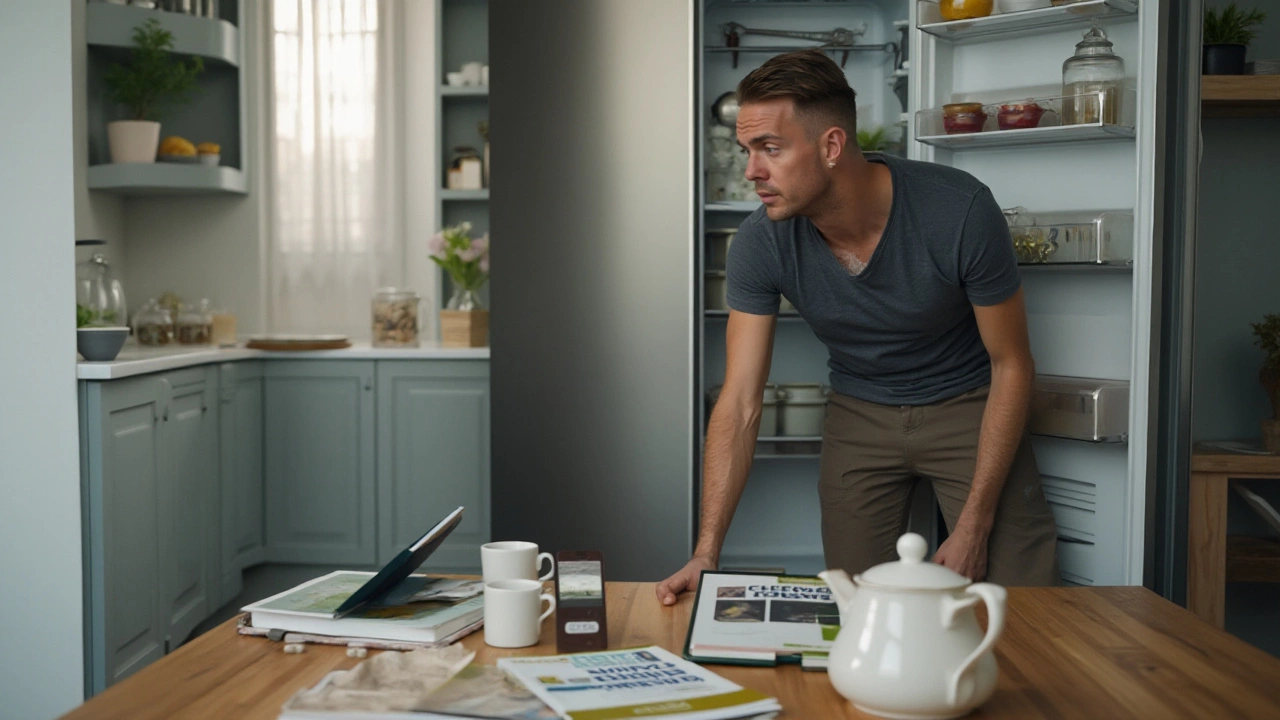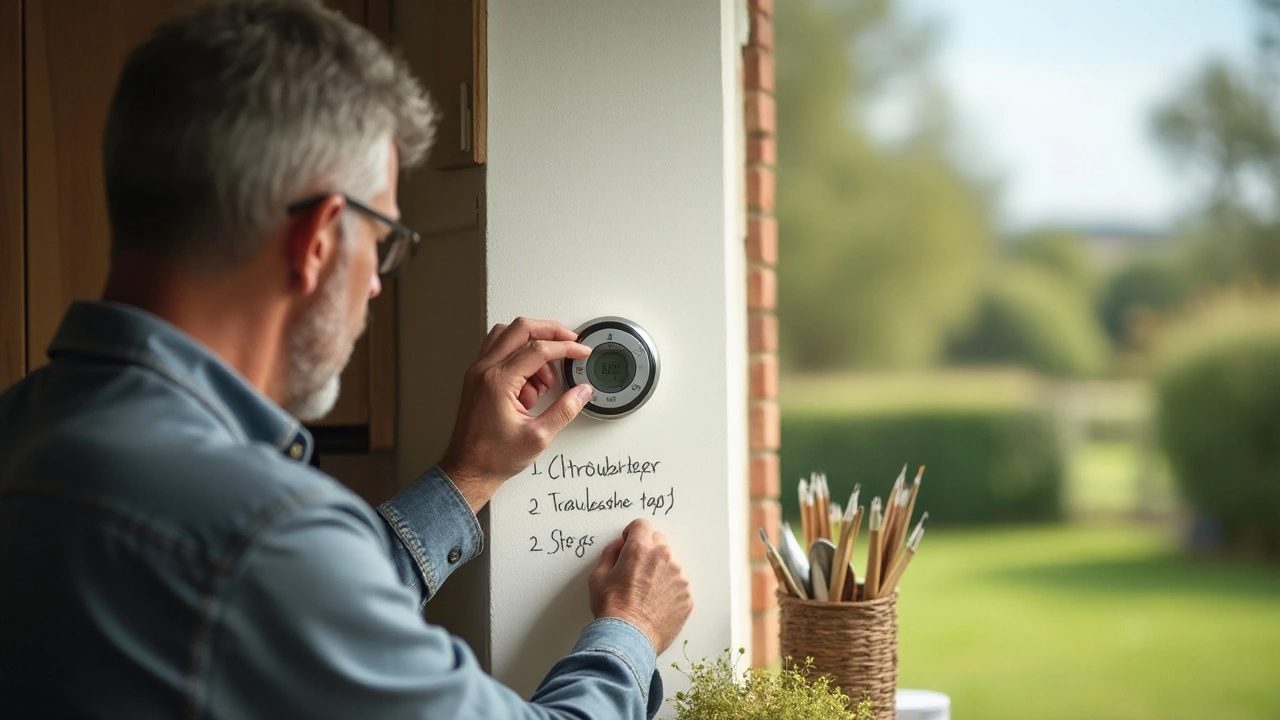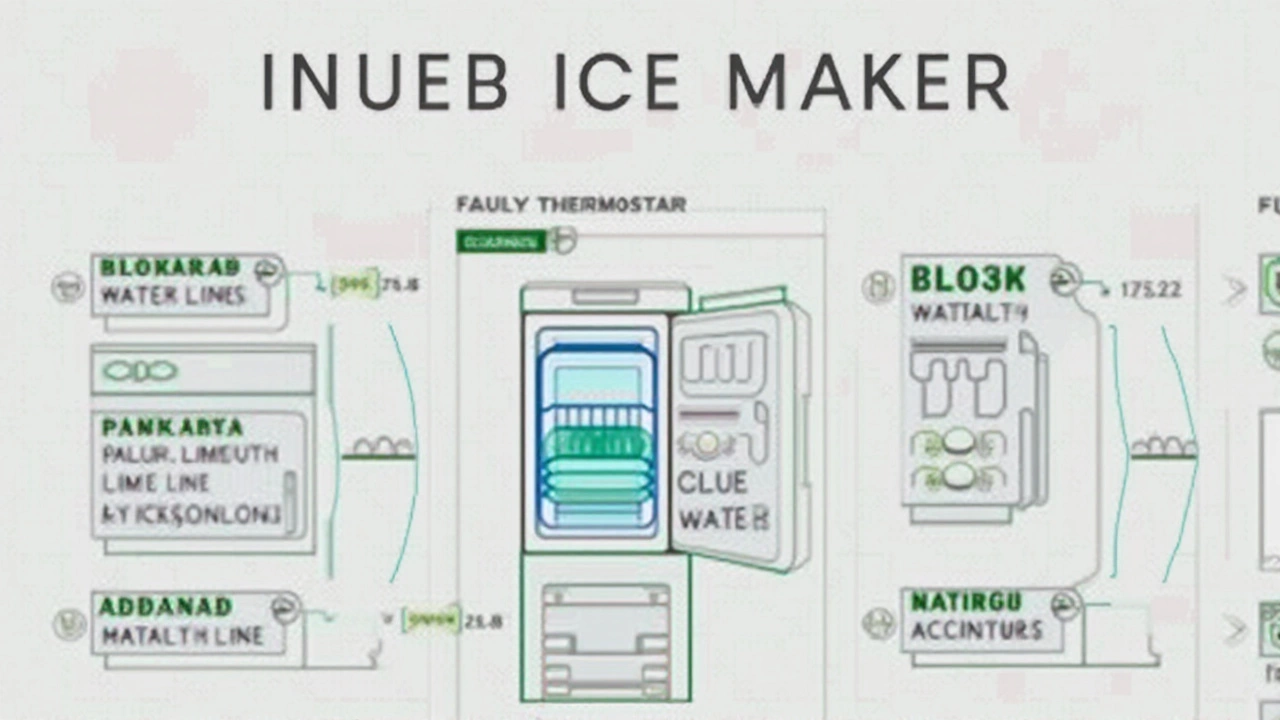The heart of your late-night ice craving might stop without warning, leaving you with lukewarm drinks and frustrated with your freezer. It’s not unusual for ice makers to encounter issues, but don't worry—most problems have straightforward solutions that you can manage on your own.
Whether it's a jammed ice tray or a more complicated issue like a water line blockage, understanding these problems is the first step to solving them. In this article, we’ll explore why your ice maker might not be making ice and how you can troubleshoot common issues to get things back on track. So, roll up your sleeves and let’s dive into the chilly world of freezer repairs.
- Identifying the Problem
- Common Causes of Ice Maker Failure
- Troubleshooting Tips
- When to Call a Professional
Identifying the Problem
When your freezer suddenly stops producing ice, it's akin to a minor household emergency, especially if you rely on it for chilled beverages or keeping food items cool during gatherings. To unravel the mystery of a silent ice maker, start with a methodical approach. Begin your quest by observing the ice maker itself. Check whether it's humming or has any flashing lights that might indicate an error. Many modern freezers are equipped with indicator lights or sounds to hint at possible issues.
Next, inspect the ice bin. Is it full, partially filled, or completely empty? This might give you a clue whether the problem lies in ice production or in the dispensing mechanism. If you notice irregularly sized ice cubes or they appear hollow, it might be a sign of restricted water flow. A quick solution would be to observe if the shutoff arm—a rod or panel that signals when the bin is full—is stuck in the 'off' position. Sometimes, resetting this arm can resolve the ice-making drought.
For deeper insights, consider the water supply. Make sure that the water line is connected properly. It’s astonishing how often an unassuming, kinked water line behind the appliance turns out to be the underlying culprit. A responsible homeowner once said, "Knowing your appliance is half the battle; solving the problem is a piece of cake once you do."
Checking these basic elements can often reveal the issue without any profound technical intervention.Should you find that the pipes are indeed kinked or blocked, it may require a simple correction to restore the flow and functionality of the ice maker.
If you've ruled out mechanical obstructions, it might be time to think electronically. Faults in the electrical or control panels can prevent the ice maker from kicking into gear. If you suspect this, make sure the freezer's electrical outlet is working properly by plugging another device into it. Also, verify that the freezer temperature is set appropriately. Ideally, your freezer's internal thermometer should read around zero degrees Fahrenheit.
Sometimes, the problem can be a little more hidden, involving the water filter. A clogged or overdue-for-replacement filter can significantly reduce water flow to your ice maker, affecting both the size and quantity of ice produced. Filters need regular under-six-month intervals to stay clear of built-up deposits. In your user's manual, you'll find specific instructions on how to replace or clear these filters, depending on your freezer model.

Common Causes of Ice Maker Failure
Ah, the trusty ice maker—a modern marvel turning water into convenience size cubes of frosty delight. However, when this appliance malfunctions, it turns ice-cold drinks into distant dreams. Understanding why your freezer has stopped producing ice requires delving into a series of possible culprits: mechanical, electrical, and even environmental.Freezer breakdowns often result from such varied issues. Let's explore the most common reasons behind ice maker failures and brighten the road to a cool resolution.
Blockage in Water Lines
One of the top reasons your ice maker may not be producing ice is a clogged or restricted water line. This could happen when mineral deposits build up over time, obstructing water flow. Another culprit could be a kink in the line, which can physically block the water. Such issues are prevalent in areas with hard water, where minerals galore trickle into your household pipes. Check where your water lines connect to the back of your freezer. If it feels like pinched nerves in a robot, there might be your problem. A quick inspection might reveal the blockage. Regular cleaning can prevent this issue, which demands simple vigilance.
Faulty Water Inlet Valve
The water inlet valve is like the butler to your ice maker, carefully controlling how much water enters the ice tray. A malfunctioning valve may not open at all, leading the ice maker to dry on its frozen promise. This can often be the case if the valve’s solenoid fails, or debris clogs it. Fortunately, a valve replacement or a deep cleaning could be the answer to your prayers, and these parts are generally easy to obtain in appliance parts shops. In some cases, electronic tests could confirm a valve failure, warranting professional intervention.
Thermostat Troubles
Ice production is an artful dance of temperature precision. Many ice makers require the thermostat to signal that the environment is cold enough to freeze water into ice. When the thermostat is faulty, the dance halts, and no cue reaches the machine. Your ice maker remains inactive, waiting in vain for the freeze-ready green light. Resetting the freezer's thermostat might solve the issue, but a repair or replacement may be needed if the thermostat refuses to budge. Ensuring optimal thermostat settings often correlates directly to device effectiveness.
Broken Ice Ejector
Imagine making an excellent ice sculpture but failing to exhibit it because, alas, it's stuck in the mold. The ice ejector can experience similar mechanical quandaries. A jammed or broken ice ejector will impede the release of ice cubes, culminating in a halted cycle. You might hear the sound of cubes struggling to launch yet no icy projectiles are in sight. Inspect for obvious jams like clumped ice or damaged ejector arms. A gentle nudge could sometimes free the obstruction, restoring your component to glory.
"Ice makers generally operate at their best when properly maintained and monitored," says Chris Hall, CEO of RepairClinic.com.
Door Seal Problems
Lastly, a simple yet overlooked cause could be the door seal integrity of the freezer. If air is breaching the sealed cold chamber, warmer air intrusion would not only melt your stored food but also throw off the temperature balance necessary for ice formation. Seals can degrade over time, springing air leaks. Regularly examining and replacing worn or cracked seals is pivotal to keeping your ice maker thriving. A well-functioning ice maker relies significantly on the consistent internal climate of its domain.

Troubleshooting Tips
When your ice maker in the freezer isn't producing cubes, it might be time to roll up your sleeves and perform a few basic checks. Start by looking at the most prominent culprit: the water supply. Without a sufficient flow of water into the freezer's ice maker, the production halts. Locate the water supply line behind the freezer; ensure it isn't kinked and the valve is open. A blocked or pinched water line is one reason for the interruption of ice production. Sometimes mineral buildup can also clog the line, requiring you to disconnect the line and flush it with warm water or a mild vinegar solution to dissolve any limescale or mineral deposits.
If the lines are fine, turn your attention to the ice maker's controls and temperature settings. Ensure the 'on' lever is in the correct position. The temperature within the freezer should ideally be below 10 degrees Fahrenheit; otherwise, the ice maker won’t function effectively. If ice frequently jams in the maker or the freeze time isn't sufficient, adjusting the freezer’s thermostat can sometimes solve the issue. Listen carefully for any sounds coming from the machine, as odd noises can hint at motor problems. Sometimes, resetting the ice maker by unplugging the freezer for about 30 seconds can help reset any fault codes.
Electrical issues are another common problem, often overlooked during manual checks. Make sure all electric connections are secure and the main control boards show no visible damage or errors. If you have access to a multimeter, you might check continuity to ensure components are receiving power. Misalignments or wear within the gearbox or motor can also impact ice production. Remove any visible ice or frost buildup from the machine parts. According to a study published in the Appliance News Journal, nearly 18% of ice maker issues are due to accidental settings changes or blockages, emphasizing the importance of regular checks.
"A typical repair might be as simple as cleaning clogged filters, but a systematic approach is essential to diagnosing ice mappers," says Steven C. Dunn, appliance repair expert and author of 'Home Appliance Whisperers'.
If your troubleshooting attempts do not resolve the issue, it might be time to check the functionality of the ice maker components themselves. Look at the ice tray, as it could be blocked or ice cubes might be misshapen, indicating problems with the fill valve or the mold thermostat. Only handle delicate components gently and with care to avoid causing further damage. For those with technical acumen, replacing the water filter might relieve performance issues, a task that should be done every six months or so.
Finally, if these steps don’t yield results, consider reaching out for professional help. While many appliance maintenance tasks are doable for the average homeowner, sometimes complex repairs require a skilled technician's eye. With their knowledge, they can quickly detect issues that generally go unnoticed, ensuring your ice maker returns to peak performance. Don't forget that keeping a fully functional machine is not just about repairs but also about regular preventive maintenance to curtail future inconveniences.

When to Call a Professional
Even the savviest DIY enthusiast knows there are moments when calling in a professional is not just prudent but necessary. Ice makers are complex appliances that combine electrical, mechanical, and plumbing systems into a very small space. If after your troubleshooting attempts your ice maker is still on the fritz, it's probably time to let a certified technician take over. It's not uncommon for underlying issues like electrical faults or intricate mechanical failures to remain hidden or be mishandled by enthusiastic amateurs—sometimes causing more harm than good.
If your freezer's ice maker isn't responding to basic fixes like adjusting the thermostat or ensuring a steady water connection, and you’ve exhausted online tutorials, expert intervention might be needed. Water leaks, electrical shorts, and inadequate water pressure are just a few scenarios where specialized knowledge becomes invaluable. Not only can professionals pinpoint the problem precisely, but they can ensure the repair doesn't void any warranties or miss safety standards which could unknowingly compromise your appliance's performance or lifespan.
There are typical scenarios where calling a professional can save headaches. For example, if there's a suspected problem with the water line, only an expert can determine if the line needs to be replaced or unclogged using the proper equipment and techniques. Also, suppose the ice maker’s motor or sensor seems faulty—these components often require skilled hands and specific tools to handle correctly.
According to the American Home Appliance Repair Directory, "Regular maintenance and professional inspections can extend the life of your appliances by up to 30%."It’s good to keep this in mind before attempting to handle more technical repairs yourself.
Calling a professional doesn't just stop potential further damage to your appliance; it also provides peace of mind, knowing the job is done right. You won't be left guessing whether the ice maker will suddenly quit again next week. Having your freezer serviced by a professional offers you a chance to discuss preventative measures and perhaps gain additional tricks on maintaining your freezer in mint condition. When considering repair costs, compare them to the implications of a possible replacement cost if something goes amiss—it's often far less expensive to fix than replace.


